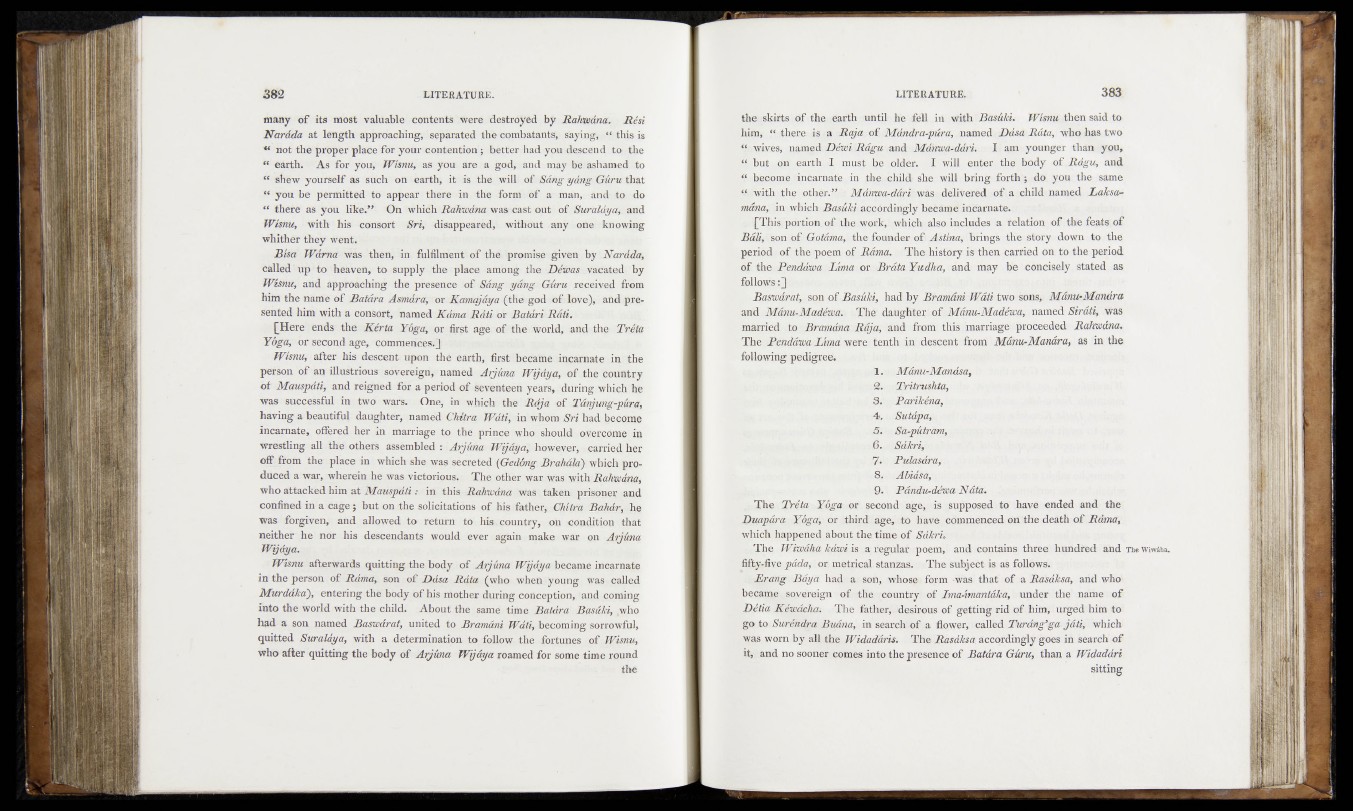
many of its most valuable contents were destroyed by Rahwdna. Rési
Nardda at length approaching, separated the combatants» saying, 'W-this is
“ not the proper place for yoor:contention ; better had you descend to- the
“ earth. As fop you, Wisnu, as you. are a god, and';may be ashamed to
“ Shew yourself as such on earth, it is the will of Sang ydng Gûru that
“ you be permitted to appear there in the form of a man, and to do
“ there as you like.“ ; f)n which Rahwdna was cast out o£Suraldyai $n.d
Wisnu, with his consort Sri, disappeared, without any one knowing
whither they went.
Bisa Wdma was then, in fulfilment! of the promise given by Nardda,
called' up to heaven, to supply the place among ,the Béwas vacated by
Wisnu, and approaching the presence of Sang ydng Gûru received from
him the name of Batdra Asmdra,~or Kamajaya (-the god o f love), and presented
him with a consort, named KdmaRdti or Batdri Rati.
£Here ends the Rérta Yôga, or first age of/tfré <world, and the:prêta
Yoga, or second age, commences*! ir
Wisnu, after his descent u p o n the' earth, first became .incarnate in the
person of an illustrious sovereign,? named Arjûna Wijdya, of.the country
of Mauspdti, and re%ned for a period of isfevénteen years, . during^which he
was successful in two wars. One, in which the Rdja «pf- Tânjung-pûra,
having a beautiful daughter, named CMlra Wdti, in whom Sri had become
incarnate, offered her in marriage to the prince •'Whajshould overcome Sn
wrestling all the others assembled : Arjûna Wÿâya;. however, o carried her
off from the place in which she was secreted (Gedông Brahâla) which produced
a war, wherein he was victorious. The other war-was! with Rahwdna,
who attacked him at Mauspdti .* in tbia-Rahwdna was taken prisoner and
confined in a cage ; but on the solicitations of his .-father, Chitra Bahdr, he
was forgiven, and allowed to return to his--,.country, op ^condition; that
neither he nor his descendants would ever again make war on Arjûna
Wijdya.
ÏVisnu afterwards quitting the body of Arjûna Wijdya became incarnate
in the person of Rdma,. son of Bdsa Rdta (who wheh young was-, called
Murddkaj, entering the body of his mother during conception, 'and coming
into the world with the child. About the same time Batdra Basulci, 4who
had a son named Baswdrat, united to Bramdni Wdti, becoming sorrowful,
quitted Suraldya, with a determination to follow the fortunes of. Wisnu,
who after quitting the body of Arjûna Wjjdya roamed for some time round
the
the skirts Of the earth untjil he deH in with Basû/ci. Wisnu'. then said to
him, ‘btteeie iis a Raja.. oê Mdndrapûva, named Bdsa Rdta, who has two
-wives,; ,namgd Béwi RAgWt&aà. Mdhwa-ddri. I. am younger than you,
^'butifcdn, earth I foj&ny I will entqr (.fh.el; hpdy of .Rdgu, and
‘f become incarnate j in ^ei-ehild/ she will bring forth'; you. the same
*4iwith),thç, ' MdiwOrdariLwas. delivered óf :,a .child: paiped. Ldkswmdna,
in which JBasuki accordingly became incarnate. ■
j: !|Thisipdrtion„^f(.lhe .wQrk, which, also, includes a relation of the feats'of
Bâti, son *JbfT Gatâma, the founder ofi Astma,1 brings the, story down to the
period of;ithefjpoemi of Rama. , The; history, is-Mhen-carried on to the period
of the,Penddwa Lima.or, .Praia Yudha, and may be concisely, stated as
follows Qy.'.-1 ;
Baswdrat, son of Bo^fiki, had. by Bramdni Wdti two sons, Mânu-Mandra
and Mânu-Madéwa.. .The' daughter, of•.MânihMadéwa, named Strati, Was
married to Bramdna Raja, and -from this.-marriage proceeded Rahwdna.
The Penddwa Lima were tenth , inhdescent from Mânu-Mandra, as in the
following pedigree.
1. Mânu-Mandsa,
■ 2. Tritrushta,
5. '- .Rarikéna,
4. Sutapa,
, S, ■ Sa-pûtram,
6. Sdikriï
Pidasdra,
Abidsa,
9. Pându-déwa Ndta. .
(1 The Trêta Yôga or second age, is supposed to have ended and the
Buapdra Yôga, or third age, to have commenced on the death of Rdma,
which happened about the time of Sdkrk 1
^ I h e Wiwdha kdwi is a regular poem, and contains three hundred and The Wiwiba.
fifty-five pdda, or. metrical stanzas. The subject is as follows.
. Rrang Baya had a. son, whose i form was that of a Rasdksa, and who
becatn®s^^!®ign ofthaveountry of Ima-imantaka, under the name of
Bétia Kéwâcha. The father,’ -desirous of getting rid of him, urged him to
go to Suréndra Budna, in search of a flower, called Turdng’ga ja ti, which
w^s worn by all the Widaddris. The Rasdksa, accordingly goes in search of
it, and no sooner comes into the presence of Batdra Gûru, than a Widaddri
sitting